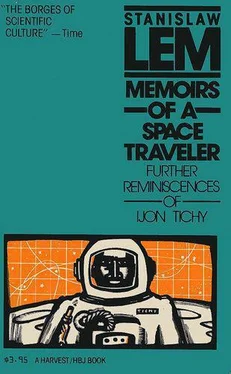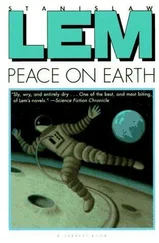The Department replied that the mental element in procreation, as recognized by and in accordance with the law, was negligible, whereas the physical predominated. Which latter did not occur in the case under discussion.
The lawyer then submitted the testimony of expert cybernetic midwives, indicating how greatly — in a physical sense — Cathodius and Melanie had to labor to bring into the world their autonomous offspring.
The Department finally decided to throw public decency aside and take a desperate step. It stated that the parental activities that causally and inevitably preceded the existence of children differed, in a fundamental way, from the programming of robots.
The lawyer was just waiting for this. He declared that children, too, were in a certain sense programmed by their parents in the course of their preparatory-preliminary activities; he asked the Department to describe precisely how, in its opinion, children should be conceived, that the act be in strict conformity with the law.
The Department, enlisting the aid of experts, prepared a voluminous reply, illustrated with plates and topographical diagrams, but since the main author of this so-called Pink Book was eighty-nine-year-old Professor Stockton-Mumford, the dean of American obstetrics, the lawyer immediately questioned his competence — in the area of causative-preparatory functions as regards parenthood — in view of the fact that, given his extremely advanced age, the professor must have lost all recollection of a number of details crucial to the case and was relying on rumors and the accounts of third parties.
The Department then undertook to substantiate the Pink Book with the sworn testimony of numerous fathers and mothers, but it was found that their statements differed considerably in places. About certain elements of the preliminary phase there was no agreement whatever. The Department, seeing that a fatal ambiguity was beginning to obscure this key issue, decided to question the material from which the alleged “children” of Mattrass and Fortinbras had been created, but then the rumor circulated (it was spread, they later discovered, by the lawyer) that Mattrass had ordered 450,000 tons of veal from Consolidated Corned Beef, Inc., and the Undersecretary of State dropped this plan in a hurry.
Instead, the Department, at the unfortunate suggestion of a theology professor, one Waugh, cited the Scripture. An unwise move, because Mattrass’s lawyer parried with an exhaustive disquisition in which he proved, giving chapter and verse, that the Lord used only one part to program Eve, proceeding by a method most outlandish compared with that customarily employed by people, and yet He created a human being, for surely no one in his right mind considered Eve a robot. The Department then charged Mattrass and his successors with violating the MacFlacon Act, since as a robot (or robots) he had come into possession of a celestial body, and robots are forbidden ownership of planets or any other real estate.
This time the lawyer submitted to the Supreme Court all the documents that had been issued by the Department against Mattrass. First — he emphasized — it was evident, when one compared these texts, that in the State Department’s view Mattrass was both his own father and his own son, and, at the same time, a celestial body. Second, the Department had misinterpreted the MacFlacon Act. The body of a certain individual, of Citizen Cathodius Mattrass, had been arbitrarily designated a planet. This conclusion was based on a legal, logical, and semantic absurdity.
That was how it began. Soon all the press wrote about was the “Celestial Body — Father — Son.” The government commenced new legal actions, but each was nipped in the bud by Mattrass’s indefatigable lawyer.
The State Department understood perfectly that Mattrass was not floating about in multiplied form in the Crab Nebula for the fun of it. No, his purpose was to create a legal precedent. Mattrass’s going unpunished would have incalculable consequences, so the finest specialists pored over the record day and night, devising ever more tortuous juridical constructions, in the toils of which Mattrass was to meet his end. But each action was countered immediately by Mattrass’s legal adviser. I myself followed the course of this struggle with keen interest. Then, unexpectedly, the Bar Association invited me to a special plenary session devoted to the problems of interpreting “ Casus United States contra Cathodius Mattrass alias Cathodius Sub One alias the offspring of Mattrass and Fortinbras alias a planet in the Crab Nebula.”
I was there at the designated time and place, and found the hall packed. The flower of the Bar filled tiers upon tiers of seats. The deliberations were already in progress. I sat in one of the last rows and began listening to the gray speaker.
“Distinguished colleagues!” he said, arms upraised. “Great difficulties await us when we proceed to a legal analysis of this problem! A certain Mattrass remakes himself into robots with the aid of a certain Fortinbras and at the same time enlarges himself on a scale of one to a million. That is how the matter looks to a layman, an ignoramus, a fool incapable of perceiving the abyss of legal problems that opens before our shocked eye! We must determine first of all with whom we are dealing — a human being, a robot, a government, a planet, children, a conspiracy, a demonstration, or an uprising. Consider how much depends on this decision. If, for example, we find that we are dealing not with a sovereign state but with a rebellious band of robots, a sort of electronic gang, then we are bound not by international law but by the common statutes regarding disorderly conduct in public places! If we rule that Mattrass, notwithstanding his multiplication, still exists and yet has children, it follows that this individual has given birth to himself — which causes the legal system terrible trouble, since we have no laws covering this, and nulle crimen sine lege ! I therefore propose that Professor Ping Ling, the renowned authority on international law, be the first to take the floor!”
The venerable professor, greeted with warm applause, mounted the podium.
“Gentlemen,” he said in an aged but powerful voice. “Let us consider first how a state is established. It is established in various ways, is it not? Our country, for example, was once an English colony; then it declared its independence and became a state. Does this occur in Mattrass’s case? The answer is: if Mattrass, when remaking himself into robots, was of sound mind, then his state-creating act has legal validity, and we could define his nationality as electric. If, on the other hand, he was deranged, the act cannot be legally recognized.”
Here an old man, grayer even than the first, jumped up in the middle of the hall and cried:
“High Court — I mean, gentlemen! I take the liberty of observing that if Mattrass was an insane state-creator, his descendants may still be sane; the state, which existed originally as a product of a private madness and thus had the nature of a morbid symptom, thereafter existed publicly, de facto , by the very consent of its electric inhabitants to the existing situation. And because no one can forbid the inhabitants of a state — who themselves have determined its legislative system — to acknowledge even the most insane authority (as has happened more than once in history), the existence of Mattrass’s state de facto entails its existence de iure !!”
“My honorable opponent will forgive me,” said Professor Ping Ling, “but Mattrass was our citizen, and consequently…”
“What of it?” shouted the irascible old man from the hall. “Either we recognize or we do not recognize Mattrass’s state-creating act. If we recognize it and a sovereign state has arisen, then we have no claim against it. If, on the other hand, we do not recognize it, then either we are dealing with a corporate body or we are not. If we are not, if we do not have before us a legal entity, then the entire problem exists only for the sweepers of the Cosmic Trash Removal Agency, since there is a pile of scrap in the Crab Nebula — and our assembly has nothing at all to deliberate on! If, however, we have before us a legal entity, then another question arises. Sidereal law provides for the arrest, that is, the deprivation of freedom, of legal and physical entities on a planet or aboard a ship. The so-called Mattrass is not aboard a ship. On a planet, rather. We should therefore apply for his extradition. But there is no one to whom we can apply. Moreover, the planet on which he lives is himself. Therefore this place, considered from the only standpoint that concerns us — namely, the Majesty of the Law — constitutes a void, a kind of juridical nullity; but neither our civil law, nor our administrative law, nor our international law deals with nullities. Therefore, the remarks of esteemed Professor Ping Ling cannot shed light on the problem, because the problem does not exist!”
Читать дальше












